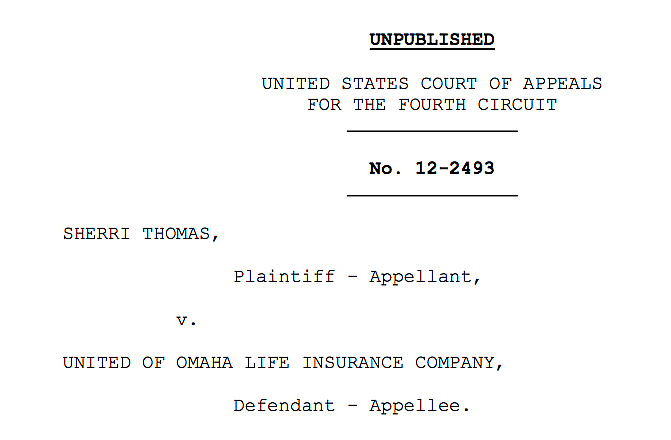Only an Accident: Insurance Claim Denied After Fatal Colonoscopy

Previous stories in William Heisel's "Only an Accident" series include:
Only an Accident: Fatal Colonoscopy Leaves Family Stunned and Unpaid
All Sherri Thomas asked for after her husband died following a routine medical exam was $67,000.
That’s not much for a life – about $2,500 per year of life lost if you consider that Duane Middleton was 54 when he died in 2010, about 27 years shy of the average life expectancy for men in Montgomery County.
Middleton’s colon was torn during a colonoscopy, and he died seven hours later. After an autopsy, the death was ruled an accident.
So Thomas asked United of Omaha Life Insurance Company for $67,000 in accidental death benefits under his insurance policy.
United of Omaha thought that was too much to pay.
The company’s argument? Everyone should know that you can die if you allow someone to perform a colonoscopy on you. That reasoning would include driving in a car, working with power tools, and taking many commonly prescribed pharmaceuticals.
Federal court records show that Middleton’s insurance plan was narrowly scripted:
Under the section of the Policy entitled “ACCIDENTAL DEATH AND DISMEMBERMENT BENEFITS,” the Policy provides that United of Omaha will pay the “Loss of Life” benefit if Middleton was “injured as a result of an Accident, and that Injury is independent of Sickness and all other causes . . . .”
Middleton was sick. He was on the waiting list for a liver transplant because of hepatitis C and cirrhosis. But the injury was independent of the illness. He was having a colonoscopy to see if he had any signs of cancer – not because he had cancer.
According to federal court records, the policy went on to describe an accident as a “sudden, unexpected and unintended event, independent of sickness and all other causes. Accident does not include sickness, disease, bodily or mental infirmity or medical or surgical treatment thereof, bacterial or viral infection, regardless of how contracted.”

It seems at first glance that unless a tree fell on Middleton in a forest, no accident could possibly have occurred.
But look a little more closely. Even the insurance company’s medical director, Dr. Thomas Reeder, acknowledged that the colonoscopy was independent of Middleton’s illness. According to federal court records, Reeder wrote:
There was no evidence of underlying colon disease prior to the colonoscopy. The perforation caused peritonitis, and he died of the resulting bacteria sepsis. The perforation did not aggravate his existing health condition. His health condition did not aggravate the effect of the perforated cecum and peritonitis.
But Reeder’s ultimate decision was what held sway:
Colon perforation is a known risk of colonoscopy and would have been noted in the consent form.
So Sherri Thomas had a death certificate declaring that her husband died as a result of an accident. She had an autopsy overseen by Assistant Medical Examiner Dr. Victor Weedn from the Office of the Chief Medical Examiner for the State of Maryland. And yet the insurance company wrote her this:
Ms. Thomas, we understand that Dr. Weedn indicated that Mr. Middleton’s death was an accident and the death certificate was amended to reflect this. However, perforation is a known risk of a colonoscopy and therefore, the perforation is not an accident as defined under the [P]olicy. Also, Mr. Middleton died of bacterial sepsis. Under the [P]olicy definition of accident it specifically states accident does not include bacterial or viral infection, regardless of how contracted. In summary, Mr. Middleton’s death was not a sudden, unexpected or unintended event, independent of sickness and all other causes. Therefore, we are unable to provide benefits under the Accidental Death and Dismemberment portion of [the Policy].
Thomas did not like that answer and went to court.
Part 1: Fatal Colonoscopy Leaves Family Stunned and Unpaid
Part 3: How judges read the fine print on a medical fatality
Photo by Sam Howzit via Flickr.

